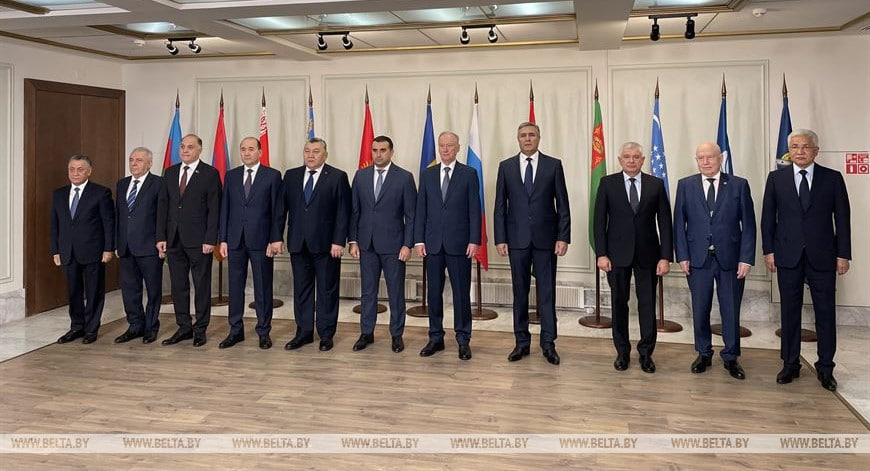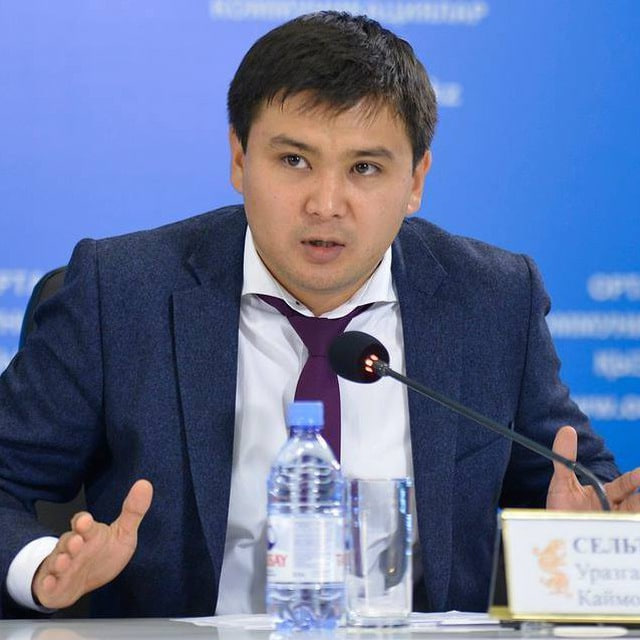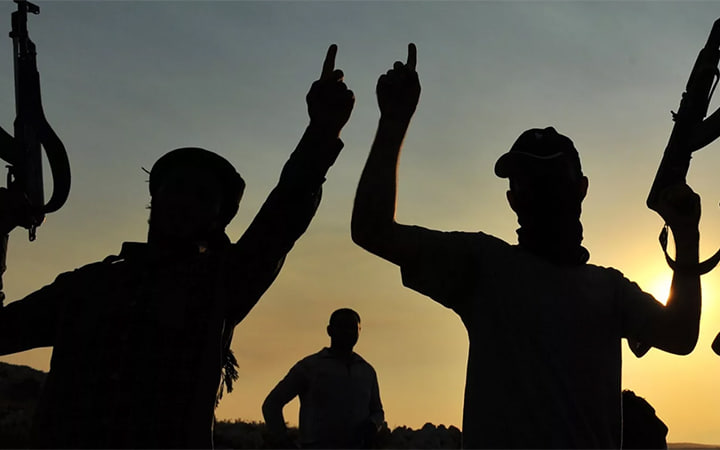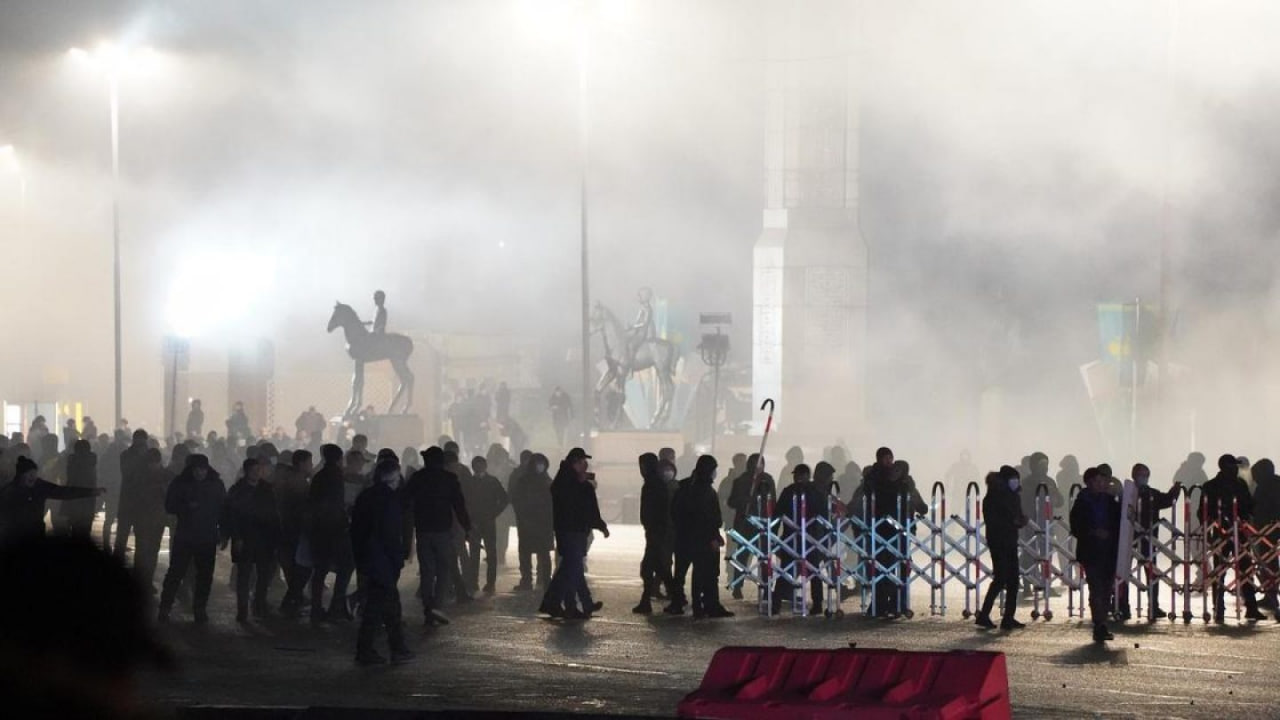Kazakhstan's Duty, Armenia's Withdrawal, or Information Wars: What Did Tasmagambetov Talk about?
 Covercollage Orda.kz
Covercollage Orda.kz
On November 8, CSTO Secretary General, Imangali Tasmagambetov, speaking in Moscow at the 11th meeting of the Secretaries of the Security Councils of the CIS member states, said that the CSTO countries are under threat.
Orda.kz decided to look into the matter.
Information Wars and Propaganda
During his welcoming speech, Imangali Tasmagambetov listed a number of threats to the CSTO countries against the background of confrontation between global players.
The deterioration of the international political situation, the intensification of confrontation at the global and regional levels is accompanied by a decrease in the level of manageability of the system of international relations. The consequence is the emergence of crisis situations at the intersection of key players’ geopolitical and geo-economic interests. The situation is aggravated by the use of hybrid technologies, which makes it much more difficult to recognize threats and establish facts of violation of national sovereignty, Tasmagambetov said.
 Photo: belta.by
Photo: belta.byAccording to him, the erosion of international law and the decline in the authority along with the status of international organizations are forming new trends in the degrading situation on the world arena. This, in turn, negatively impacts the state of CSTO states’ national security.
The CSTO's area of responsibility has already become a place where various hybrid technologies are being tested and serious threats to the internal stability of the Organization's member states are being formed, Tasmagambetov said.
 Urazgali Selteyev / Photo from personal archive
Urazgali Selteyev / Photo from personal archiveAccording to the director of the Institute of Eurasian Integration, Urazgali Selteyev, by hybrid technologies Tasmagambetov means political propaganda emanating from global players' mouthpieces.
I would not call it threats, because there are no direct threats to the CSTO countries. Rather, the participating States have indirect risks in terms of a geopolitical confrontation's impact on their domestic political situation. This concerns information wars between major powers, which also ricochet and hit the CSTO countries. Russia, the United States and China, with powerful propaganda machines, promote their agenda in our states' information fields. Thus, they are trying to increase loyalty to themselves and at the same time create a negative image for their rivals, nothing more, the expert says.
 Orda.kz collage
Orda.kz collageHe adds that the so-called hybrid technologies may be an attempt at ideological influence, but do not pose a destabilizing threat.
I do not agree with Tasmagambetov's words when he generalizes and calls it hybrid technologies because in this case it is implied that one of the major powers has goals or intentions to destabilize the internal political situation in the CSTO countries. This is unlikely, and such a statement on the matter is more like an exaggeration and excessive escalation. In this context, it is more important for us to take into account what economic costs we will incur in the future, where, within the framework of trade and technology wars, the deterioration of relations between Washington and Beijing is paramount, and at a secondary level — the protracted geopolitical confrontation between the United States and Russia.
Let Down
Imangali Tasmagambetov also noted that "the confrontation at the global level inevitably affects the regional and even sub-regional levels, where long-standing problems worsen and new ones appear."
Often local problems are of such a specific nature that no global international organization is able to solve it. It is critical that these local problems can develop into regional ones in the case of explicit or clandestine interference by external forces pursuing destructive goals. In the case of the CSTO's area of responsibility, territorial disputes, the problem of borders and border conflicts can be attributed to such, the Secretary General said.
 Rasul Arin / Photo: cabar.asia
Rasul Arin / Photo: cabar.asiaAccording to political analyst, Rasul Arin, by this Tasmagambetov meant Armenia's potential withdrawal from the CSTO.
As a result of the Karabakh war, it can be seen that such CSTO members as Armenia cannot count on the protection from the organization. The main threat to the CSTO now is Armenia's withdrawal from the membership. The organization itself is very static, and Armenia's exit is the biggest problem for its structure and name than a possible external threat.
Speaking about the conflict in the South Caucasus, Tasmagambetov emphasized that the CSTO’s draft decision aimed at defusing the situation in the region was not adopted in November last year. He added that the draft also remains in force if consensus is reached.
And as an example of solving such issues, Imangali Tasmagambetov drew attention to the conflict between Tajikistan and Kyrgyzstan. According to him, it "is gradually being resolved without intermediaries and thanks to the efforts of the heads of state."
In May 2023, Armenian Prime Minister Nikol Pashinyan said that the issue of Armenia's withdrawal from the CSTO was relevant. But in early November, Armenian Deputy Foreign Minister, Paruyr Hovhannisyan, said that the country was not discussing said withdrawal. He added that Yerevan continues to take part in meetings on the platforms of the CSTO, the CIS, and the Eurasian Economic Union (EAEU).
There were also reports that, before ratifying the ICC's Rome Statute, Armenia had offered Russia to sign a bilateral agreement allowing Yerevan to bypass regulations related to the International Criminal Court's (ICC) arrest warrant for Vladimir Putin.
Destructive Religious Movements
Tasmagambetov also spoke about the danger of terrorist activity spreading, illegal migration, and illegal weapon and drug trafficking on the southern borders of the CSTO’s zone of responsibility.
The infiltration of terrorist and extremist elements is connected not only with the extremely difficult situation in Afghanistan, but also with instability in the regions bordering Afghanistan. All this further actualizes the task of promptly completing work on the draft of the CSTO's Targeted Interstate Program to strengthen sections of the Tajik-Afghan border.
 Photo: elorda-din.kz
Photo: elorda-din.kzUrazgali Selteyev noted that he considers the CSTO Secretary General's concern about the spread of religious extremist movements in the region appropriate.
But I agree that the spread of religious extremism is a direct threat. After all, there are many "sleeping" cells of radical pseudo-Islamic movements on the territory of Central Asia. Indeed, these are not only threats emanating from Afghanistan, but also the adjacent territories. But this problem has been known about for a long time. This is what the security services should be engaged in or are engaged without publicity. And the CSTO forces need to concentrate on this. At the same time, the CSTO members within their states should independently work with such risks. Firstly, in information policy it is necessary to form and manage your agenda, neutralizing external influence. Secondly, in order for people to be able to critically recognize manipulations and the implantation of extremist ideas, it is necessary to systematically address the matters of educating the public. The authorities should work directly to ensure that there is a sufficient level of general education, legal, political, and religious culture in our countries, the expert says.
Convient Opportunity
CSTO Secretary General Imangali Tasmagambetov reserved the most interesting statement for the end of his speech. Speaking about the key areas of the CSTO's activities, he said that "the organization proved its effectiveness in January 2022 during the defusing of the crisis in Kazakhstan."
 Qantar / Photo from public sources
Qantar / Photo from public sourcesAccording to political scientist Rasul Arin, for the first time in its history, the CSTO was active during the January events.
The peacekeeping track is a play on words to remind once again about Kazakhstan's obligation to the CSTO, which has shown some activity for the first time in its history. For such a passive organization as the CSTO, Qantar turned out to be a convenient opportunity to demonstrate itself, although there were plenty of other such opportunities in the region before that. Plus, the reason for the deployment of CSTO troops was not justified. The attack of 20 thousand terrorists was the necessary narrative to create a legitimate base for this operation.
The expert summarized that in the event of a real conflict or danger, the CSTO is unlikely to be able to play a peacekeeping role.
Original Author: Silam Aqbota
DISCLAIMER: This is a translated piece. The text has been modified, the content is the same. Please refer to the original article in Russian for accuracy.
Latest news
- Kazakhstan Lifts Gallium Export Duty
- Chinese Firm Proposes to Fund New Port and Logistics Hub in Mangystau Region
- ForteBank Stock Soars on Home Credit Deal, Then Plunges 30% in a Day
- Coins Believed to Be Tied to Kairat Satybaldyulyuly to Be Auctioned
- Ukraine’s Military Intelligence Chief Says Ceasefire Should Come Before Year’s End
- Kyrgyz Citizen Fined in Kazakhstan for Carrying Banned Book Across Border
- Trial of Former Financial Police Officers in Khorgos Case No. 1 Closed to Public Over State Secrets
- Kazakhstan to Ban Outdoor Currency Rate Displays at Exchange Offices Starting September
- Armenian Court Orders One-Month Detention for Tashir Pizza Executive Amid Ongoing Investigation
- Kazakhstan May Require Banks to Offer Deferrals to Socially Vulnerable Borrowers
- Almaty Utility Pursues Debt Collection for Unpaid Heating and Hot Water Bills
- Kazakhstan and Afghanistan Sign Railway Memorandum
- Kazakhstan's National Bank Keeps Interest Rate at 16.5%, No Cuts Expected Until 2026
- Vyacheslav Kim Finalizes Purchase of Alatau City Bank
- Wild Arman Associate Detained in UAE Over Alleged Role in Qantar Riots
- Ulytau Region Akim Sues Woman for 495,000 Tenge Over TikTok Video
- Ukrainian Entrepreneurs Move to Buy BTA Bank from Kazakh Businessman Kenes Rakishev
- Kazakhstan’s Foreign Debt Hits 170.5 Billion USD in Q1 2025
- Regulator Flags Pricing Issues in Yandex Go Audit, Company Ordered to Adjust Policies
- Azattyq Prepares Lawsuit Against Kazakh Foreign Ministry Over Denied Press Accreditations

